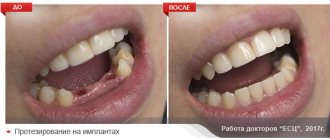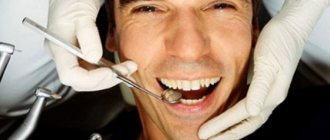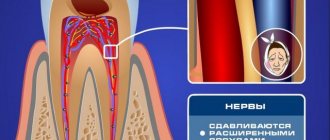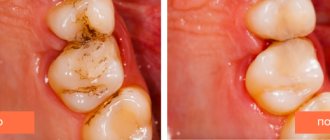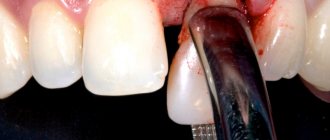The times when patients associated visiting a dental clinic with medieval torture are, fortunately, long gone. Today, thanks to modern technologies and their safe use, dentistry allows you to receive high-quality and painless treatment.
In order to help young patients with multiple dental lesions, for children with developmental disabilities, for people with panic fear or simply anxiety before dental procedures, superficial and deep sedation (general anesthesia) is used. Our clinic’s specialists use anesthesia to remove molars, treat caries and its complications, implantation and other procedures.
Anesthesia in dentistry and its difference from sedation
General anesthesia is an alternative to local anesthesia. It involves completely shutting down a person's consciousness to cause loss of sensitivity during treatment. Dental treatment under anesthesia in adults is usually carried out in cases where it is impossible to use other types of anesthesia. Sometimes they resort to using sedation.
Sedation is often confused with anesthesia, but in fact it is an intermediate link between general anesthesia and dental treatment with anesthesia. In this case, the person is in a state of half-asleep, on the border of sleep and consciousness, while at the same time the contact between the patient and the doctor is maintained.
The similarity between sedation and anesthesia is that they are carried out by an anesthesiologist using the same drugs, but the consequences of sedation are milder, since the dosage is much less.
When general anesthesia is administered, the patient falls into deep sleep. He is unconscious. Dental treatment under anesthesia is rarely practiced, since the number of contraindications and risks of complications in this case exceeds the number of prerequisites for it. If possible, it is better to avoid it, as it has a toxic effect on the human body, especially on the heart, cardiovascular and nervous system. Local anesthesia copes with pain relief no worse, most importantly, without serious consequences.
Removal of baby teeth in children
Most parents mistakenly believe that since the child’s baby teeth are replaced by molars, then they can be removed without fear. But the problem is that premature removal of baby teeth can cause incorrect bite formation in a child, impaired chewing function or pronunciation, and other negative consequences. Therefore, in pediatric dentistry, surgical intervention is carried out exclusively according to the doctor’s indications and only in the most extreme cases. This procedure is absolutely painless for the child and, as a rule, does not cause complications.
Indications for treatment under anesthesia
- Dentophobia/stomatophobia (panic fear of dentistry in both children and adults);
- Very low pain threshold;
- Strongly expressed gag reflex;
- Individual intolerance to drugs included in local anesthesia, allergic reactions;
- Mental abnormalities that exclude the possibility of contact between the doctor and the patient, when the patient is unable to adequately respond to the doctor’s actions;
- A large amount of work, or a very long treatment time;
Contraindications
- Diseases of the cardiovascular system in chronic and acute form;
- Asthma;
- Diabetes;
- Acute myocardial infarction;
- Respiratory tract diseases in the acute stage;
- Mental disorders in the acute stage;
- Acute diseases of the nervous system;
- Pneumonia;
- State of alcoholic intoxication;
- Immunodeficiency conditions;
- Severe kidney and liver diseases;
- Pregnancy.
Online consultation with a doctor
If you are interested in the topic of dental treatment under anesthesia or are already undergoing surgery. When not everything is clear and there are doubts and problems. It is best to undergo an examination and consultation with another dentist. Online communication with a specialist is quite capable of replacing a full-fledged appointment with questions and answers. The doctor will listen, help you decipher the tests, pictures, and give recommendations specifically for your specific situation, taking into account all the information provided to him. This will help you understand the topic sufficiently and calmly and confidently approach treatment using anesthesia.
Cost of treatment
The cost of treatment and the price of tooth extraction in Ufa will be determined by a number of factors - types of preliminary diagnostics, complexity of surgery, type of anesthesia used, etc.
Important to remember! You can’t ignore toothache and put off visiting the dentist. The sooner you seek help from our specialists, the greater the chance of saving the affected tooth and avoiding possible complications and expensive treatment.
Subsequent restoration of a lost tooth will also require the help of experienced clinic doctors. Using modern methods and materials, they will restore the beauty of your smile and relieve you of discomfort.
How is treatment performed under general anesthesia and its types?
To be able to carry out treatment under general anesthesia and guarantee the safety of patients, a dental clinic must have a number of characteristics, namely:
- Have a license for anesthesiology and resuscitation, as well as the right to use potent drugs;
- Have a staff of anesthesiologists and resuscitators, have all the necessary equipment and equipment;
- Set up a temporary room for the patient until the general anesthesia wears off.
Advantages of dental treatment under anesthesia in our dentistry
Patients of the Family Dentistry Center can be confident in the safety of the procedure, because the anesthesiologist at our clinic, Mardanov Adil Zinnurovich, is a doctor of the highest category, a candidate of medical sciences with more than 15 years of experience in anesthesiology.
Dentists who provide treatment under anesthesia are experienced and certified specialists who constantly improve their knowledge and skills. Technologies and methods used in dental treatment are modern, safe and reliable.
The dentist is assisted in his work by 2 experienced assistants, which greatly facilitates his work and reduces the intervention time. In one intervention, you can sanitize the entire oral cavity. The patient’s memory does not retain the negative experience of dental intervention, and many patients, after such treatment, calmly tolerate dental procedures without the use of anesthesia.
Among other advantages of our services, it is worth noting the provision of complete comfort for the patient and the use of exclusively proven treatment methods. By contacting us, you can be sure that the treatment procedure will be painless and that the desired result will be achieved.
Expert opinion
Emir Romanovich Omerelli
Maxillofacial surgeon, implantologist
Experience: more than 13 years
To exclude the development of complications, before starting treatment it is necessary to conduct a thorough examination: ECG, X-ray of the lungs, consultations, if necessary, with a therapist, cardiologist and other doctors, collection of blood tests. All this is important to fully assess the patient’s condition and select the optimal type and drug of anesthesia.
They are as follows:
- Mask (inhalation), which is carried out by the patient inhaling a mixture of oxygen and anesthetic gases through a mask. This type of anesthesia is often given to children;
- Intravenous. By introducing anesthetic drugs into the blood.
Dental procedures that can be performed under general anesthesia:
- Removal of a tooth cyst;
- Removal of several wisdom teeth;
- Multiple dental implants.
Wisdom tooth removal
Is it necessary to remove wisdom teeth?
If the tooth development process proceeds normally, then extraction can be avoided. In addition, in some situations, wisdom teeth become supports when installing dentures. By contacting the dental clinic Z 32, you will undergo an examination and receive competent advice on the need to remove wisdom teeth. Professional and experienced doctors will conduct a visual examination, take into account the results of the X-ray examination, and make a decision taking into account your interests. Don't worry about tooth extraction being painful. We will carry out the procedure carefully, with the maximum level of comfort while completely blocking pain symptoms. Sensitive attitude to the well-being of each patient and modern anesthetics allow the operation to be performed quickly, efficiently, and delicately.
Reasons for wisdom tooth removal
- incorrect location of the tooth in the row, which serves as a source of injury to the soft tissues of the gums and cheeks;
- incorrect eruption affecting the root system of neighboring teeth, which interferes with their harmonious development (lateral, inclined partial eruption);
- ingrowth of wisdom tooth roots into the maxillary sinus;
- severe mechanical destruction of the coronal part, an infectious process or the development of complicated caries in the tooth, when its restoration is impossible;
- facial neuralgia due to impacted wisdom teeth.
Since the “eights” are located in a difficult-to-reach area of the jaw, it is almost impossible to get to them for proper treatment. Therefore, in most cases, a decision is made to remove them.
Doctor's recommendations after wisdom tooth removal
Wisdom teeth removal is performed using local anesthesia, so there is no pain at all during the operation. After the anesthetic wears off, discomfort, fever, and swelling of the gums may occur. This is a normal reaction of the body. The discomfort will go away within a few days, but until then it is important to follow the doctor’s recommendations:
- do not eat in the first couple of hours after tooth extraction;
- do not brush your teeth for 24 hours after visiting the clinic;
- Avoid hot drinks and food for the first 24 hours;
- rinse the mouth with great care;
- It is better to take soft food in the form of purees or small pieces, which must be chewed on the opposite side of the jaw;
- In case of severe pain, you should take analgesics recommended by your doctor.
Under no circumstances should you warm your cheek in the area of the removed wisdom tooth or feel the wound with your tongue because of the risk of causing complications.
our specialists or make an appointment right now by phone: 8 (347) 299-64-64. Call.
Possible complications during general anesthesia
There are many side effects of general anesthesia. Sometimes, even in the absence of contraindications, the body's reaction to an anesthetic can be unpredictable, so anesthesia is always a risk. The following complications may occur:
- Decreased cognitive function of the brain;
- Difficult recovery from anesthesia, prolonged confusion;
- Dizziness;
- Nausea and urge to vomit;
- Strong headache;
- Muscle pain;
- Injury to the oral cavity (tongue, teeth, lips);
- Respiratory tract infection;
- Severe brain damage, death (the percentage of cases is minimal).
Treatment prices
Dental procedures performed under anesthesia are quite expensive. It consists of a consultation with an anesthesiologist, the qualifications of all doctors involved in the process, the type of anesthesia, the drug administered, the prestige of the clinic and is calculated in proportion to the treatment time. In Moscow, treatment under anesthesia will cost from 15,000 rubles per hour. In the regions of Russia the price is lower, ranging from 10,000 rubles per 1 hour.
It is very important to inform patients about all the nuances of treatment using general anesthesia, so that the person can assess the risks and decide whether to undergo treatment under anesthesia or choose safe local anesthesia. Treatment and removal of teeth under anesthesia can really be effective, the main thing is not to forget about the restrictions and contraindications. No dentist can guarantee the absolute success and successful outcome of this method. In addition, careful preparation of the patient for general anesthesia, exclusion of contraindications, and strict adherence to the doctor’s prescriptions are absolutely necessary.
How is treatment performed under Sevoran sedation?
- During the operation, there is an anesthesiologist nearby, whose work experience is more than 20 years. We also monitor blood pressure, pulse, ECG, saturation.
- Treatment is carried out only in a sterile operating room.
- The process involves a team of specialists: a dentist, an assistant, an anesthesiologist, and a nurse anesthetist. Thanks to this, it is possible to complete the work quickly and efficiently. All our doctors are professionals with extensive experience and are trained abroad in the best clinics in the world.
